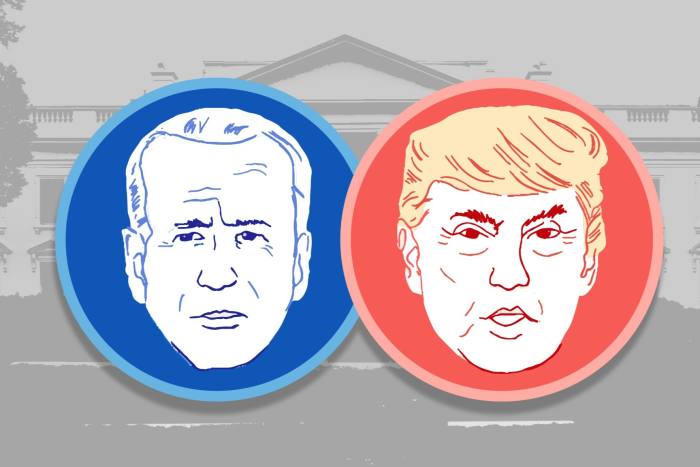
Donald Trump could be discharged from hospital on Monday, after a weekend of obfuscation by the White House that played down the severity of the US president’s condition when he was admitted to the Walter Reed medical centre on Friday.
Sean Conley, the White House physician, told reporters on Sunday morning that the medical team treating the president were pleased with his progress. “The president has continued to improve,” he said, acknowledging for the first time that Mr Trump’s oxygen levels had dropped twice over three days and on one occasion he had required oxygen.
Brian Garibaldi, another doctor, said that if Mr Trump continued to feel as well as on Sunday, “our hope is that we can plan for a discharge as early as tomorrow to the White House where he can continue his treatment course”.
Mr Trump’s illness comes at a critical point for his re-election campaign. He had recently started ramping up campaigning in swing states as he tries to catch up with Joe Biden, his Democratic rival, in the polls.
A new NBC/Wall Street Journal poll on Sunday gave Mr Biden a 14-point lead, up 6 points from several weeks ago. Mr Biden also leads Mr Trump in every swing state, underscoring the tough battle the president faces over the next 30 days.

His re-election campaign suffered further blows at the weekend as a steady list trickled out of those closely involved with the president’s campaign who had also contracted Covid-19.
Bill Stepien, his campaign manager; Kellyanne Conway, a former top White House aide; and Chris Christie, the former New Jersey governor, all tested positive. The latter two helped Mr Trump prepare for his first debate against Mr Biden last Tuesday. It remains unclear whether the next debate on October 15 will go ahead.
Coronavirus infection rates across the US have continued to rise unabated. New York City mayor Bill de Blasio said on Sunday that businesses and schools in nine neighborhoods in Brooklyn and Queens were closing again. Indoor and outdoor dining will also be closed, while places of worship will remain open with restrictions.
“You don’t do this lightly — you do this when the facts demand it,” Mr de Blasio said, adding that he had warned people of more restrictive measures “and now, we’re imposing them”.
Trump vs Biden: who is leading the 2020 election polls?

Use the FT’s interactive calculator to see which states matter most in winning the presidency
Mr Trump was moved to hospital on Friday after testing positive for Covid-19 and developing a fever. The White House at the time said he had “mild symptoms” and was being hospitalised as a precaution.
On Saturday, Dr Conley evaded questions about whether Mr Trump had received oxygen as he presented a rosy picture of his health situation. But immediately after the briefing, Mark Meadows, White House chief of staff, told the same reporters that the situation had been much more severe.
“The president’s vitals over the last 24 hours were very concerning and the next 48 hours will be critical in terms of his care,” Mr Meadows told the reporters. “We’re still not on a clear path to a full recovery.”
Asked on Sunday who the public should believe, Dr Conley said Mr Meadows had been misunderstood. He said he had been referring to a “transient” moment on Friday when Mr Trump had a high fever and required oxygen.
Dr Conley also revealed that Mr Trump had suffered a second fall in oxygen levels on Sunday, and was now being administered an anti-inflammatory steroid called dexamethasone to help him breathe. He said his answers on Saturday had not given an accurate picture of the situation.
Are you under 30?

We are exploring the impact of the pandemic on young people and want to hear from readers between 16 and 30. Tell us about your experiences from the past six months via a short survey.
“I was trying to reflect the upbeat attitude that the team, the president . . . has had,” Dr Conley said. “I didn’t want to give any information that might steer the course of illness in another direction. And in doing so . . . [it] came off like we were trying to hide something which wasn’t necessarily true.”
Earlier on Sunday, Robert O’Brien, US national security adviser, said Mr Trump wanted to return to the White House, but would stay at the hospital as he approached a critical phase. “Day seven and eight are the critical days, so I think the doctors want to make sure they’re there for the president.”
But in yet another contradiction just hours later, the medical team at Walter Reed suggested that Mr Trump could be discharged as early as Monday.

Follow Demetri Sevastopulo and Aime Williams on Twitter